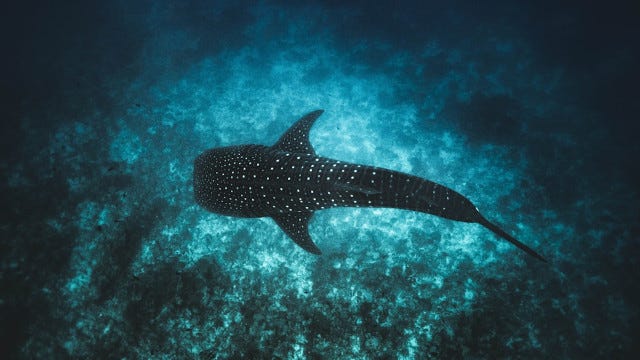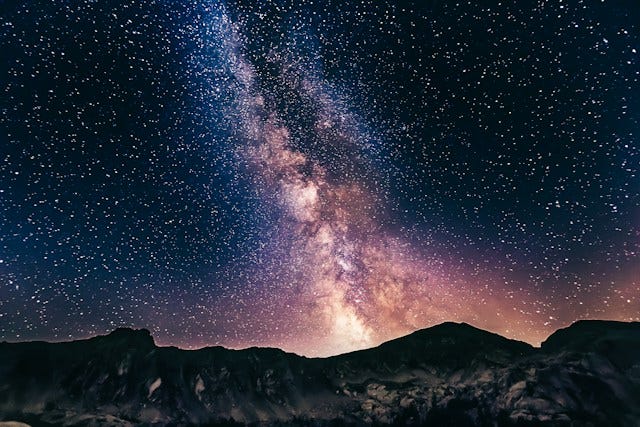When we were young, life was a constant wonder, and filled with awe through the discovery of many new things about the world in our immediate environment. As we grew older, the sense of wonder diminished, and so did our experience of awe.
In my early twenties, I didn't realize I had been missing the experience of awe for a long time. My focus was solely on completing my undergraduate studies and finding immediate employment, influenced by my Chinese-Malaysian upbringing.
While navigating the rat race, contemplating climbing the career ladder, deciding against it, and becoming an independent contractor, I lost touch with awe. I was also in an unhappy relationship that did not align with my true self then, and I myself had almost forgotten who I was.
Then, an opportunity presented itself - a three-month contract work in the Philippines - just what I needed. I was plucked out of my “bubble” and plunged into the unknown, which, in retrospect, was not much of the unknown. It was, in fact, my desired way of life. It was how I would have wanted to live.
During my short stint in the Philippines, I lived a life filled with awe. The kindness and openness of the Filipinos, the untouched beauty of the sea and islands, obtaining my first diving certification, snorkeling endlessly under the sun, and sitting at the front of a sailing boat witnessing the sunset—all contributed to my encounters with awe.
These encounters with the sublime have awakened me and made me question my own paradigm, reflecting on how I have been living and perceiving the world through a narrow lens. I have come to realize how little I truly know and how limited my experiences have been.

I remember I was barely there for a week when I learned that my colleagues were going to swim with the whale sharks in Donsol the following weekend. I was momentarily discouraged that I had missed the opportunity, but no, Thessa, my first friend and colleague, invited, in fact, persuaded me to join them.
It didn't matter that there wasn't enough room for all of us to sleep, even without me, nor how we would manage to add another person to the logistics. In the end, we made it, and I found myself swimming next to a giant whale shark, so large I dare not describe the size lest I have inflated it in my memory. The experience was an awe so profound that I find it difficult to put it into words.
From this experience, I learned from the Filipinos that by caring for one another, we can overcome any obstacle and collectively embrace moments of awe, leading to deep and meaningful connections.
So what is awe or the sublime?
Awe is the feeling of something vast that transcends our understanding of the world, and a need for accommodation (meaning to how we make sense of and adjust to what we experience) - Dacher Keltner and Jonathan Haidt.
When I experience awe, my consciousness will be summoned into the moment, and I will experience everything in its heightened sense, and my contemplation of it will go into overdrive. Then, there will be an overwhelming feeling coming from the center of my body, the feeling that I am not alone in this world, that I am small and the universe is large, and that somehow, even then, I don’t feel alone because we are all connected.
It is one of the most profound experiences one can have. It is the moment when we can briefly commune with the universe and return to the beginning or glimpse at the end of life.
What about the sublime? When I think of the sublime, I think of those moments of awe when I am struck by the beauty of nature, the wonder of the world, or the immensity of time.
Like the first time, I sat on a peak in the desert, staring into the horizon surrounded by golden sands in every direction. Or the time when I was lying alone in my sleeping bag somewhere atop the Drakensberg, staring up into the starry sky with the Milky Way stretching across it like a rainbow. It was also the time when I placed my palm upon a few-thousand-years-old cedar tree in Yakushima, sensing the span of time beyond any human life, communicating with those who had come before me seeking solace with this very same tree.
“The feeling of the sublime is at once a feeling of displeasure, arising from the inadequacy of imagination in the aesthetic estimation of magnitude to attain to its estimation of reason, and a simultaneous awakened pleasure, arising from this very judgment of the inadequacy of sense of being in accord with ideas of reason, so far as the effort to attain to these is for us a law.” - Kant
In essence, the feeling of the sublime involves a tension between our senses' inadequacy and our reason's capacity to comprehend the infinite or the immense. This tension leads to the so-called need for accommodation - we must redefine our thinking or realign how we live to accommodate this awakening.
The word for awe in German, “Ehrfurcht,” combines the notions of reverence (Verehrung) and fear (Furcht), encapsulating this profound feeling beautifully. There is this reverence for the sublime combined with a sense of fear, acknowledging that it surpasses our limited understanding.
Why do we need awe?
Brief experiences of awe will redefine the self in terms of the collective and orient our actions towards the interest of others or something other than the self. One cannot stare into the Milky Way and not feel that there is more than oneself.
These brief encounters with the sublime have the power to spark wonder and curiosity within us. They serve as a reminder to maintain an open mind, welcome new experiences, and nurture lifelong learning.
The need for accommodation following encounters with awe or the sublime will help to shape us into a better person. It compels us to shed prejudices, expand our minds, and perceive things beyond our initial assumptions. It calls into question our prejudgments and societal conditioning. Through this ongoing process of reflection and reevaluation, we continually redefine ourselves to become our best selves.
Most importantly, I find that it is one of the catalysts to conscious living. The experience of awe brings us back to the present moment, calling our conscious mind into active engagement. It makes us aware of the here and now. The need for accommodation will further strengthen our conscious mind as it contemplates its place in the universe.
Travel for awe
Traveling provides a fertile ground for encountering awe-inspiring moments. It takes us out of our comfort zones and familiar territories, immersing us in different systems and people whose lives and cultures often seem foreign to us. Yet, during close encounters with the people along the way, I have not only discovered our similarities, I was also met with consistent acts of kindness.
These awe-inspiring experiences have repeatedly reshaped my perspectives, leading me to firmly believe that at the core of humanity lies goodness. They have left me with a profound sense of connection to humankind and the world at large, transcending borders and cultures and languages and religions and whatever divides us.
In our travels, we often seek out the renowned wonders of the world, such as the so-called tourist attractions, but we also explore the unknown and the untrodden paths. Whether it’s marveling at the iconic pyramids in Egypt or discovering the obscure temple near Kampong Cham in Cambodia, both have the power to evoke awe.
How to find awe in everyday life
But not all of us can travel all the time, and not everyone desires to do so, although I personally wish I could. Fortunately, we can still find awe in our everyday lives as well.
There are many ways we can find awe in everyday life; one that is recommended by Dr. Kletner himself is to take an awe walk. This practice involves being mindful, taking deep breaths, removing distractions such as phones, and consciously attuning yourself to your surroundings.
By adopting this approach, one can actively seek out things that inspire awe, be it in a natural or urban environment. The key is to cultivate awareness and openness to the awe-inspiring moments that can be found anywhere.
Here are some more ideas or ways to find awe in our everyday life:
Take advantage of collective awe. Attend a concert of your favorite artist and join the collective joy with fellow fans. Alternatively, go to a congregation that resonates with your values and commune with like-minded people.
Look for a dark park or any spot away from urban light pollution, and enjoy some stargazing. Bring along a comfortable picnic mat and invite your loved ones to join you in contemplating the vastness of the universe.
Search for opportunities to witness sunrises or sunsets. You can embark on a rewarding hike to a peak and savor the view, or simply enjoy them from the comfort of your own home, gazing out of a window or balcony. When did you last enjoy a well-earned sunrise or relax after a long day with a mesmerizing sunset?
Look up the oldest tree in your area. Find it, touch it, and contemplate the countless individuals who have come and gone before you, as well as those who will follow, all connecting with this same ancient tree.
Do share the last time you experienced awe or if any of the above brings you to it!
Explore more ways to conscious living:






This is a beautifully written piece Rachel. Thank you for making moments of awe seem so attainable (and essential).
I was directed to this via Tiffany Chu's directory and was immediately drawn to the title 🥰 I enjoyed reading this and was thinking to myself "how can we experience more awe in day-to-day life?" and then you include that as a section! Love the ideas here, and it's reminded me to slow down (again, I'm always being reminded of that!) and notice the world around us, so thank you x